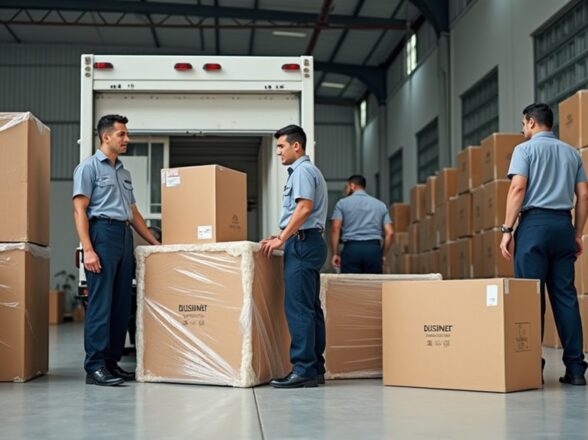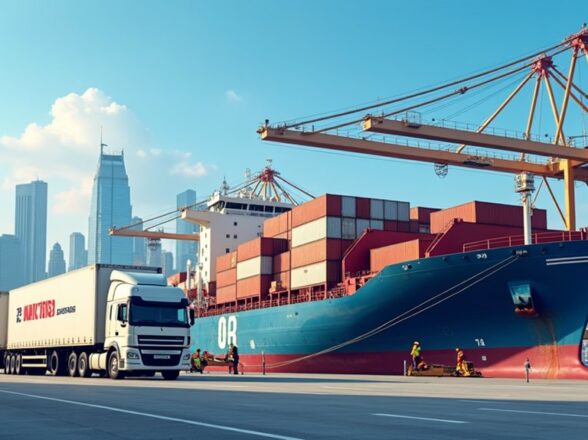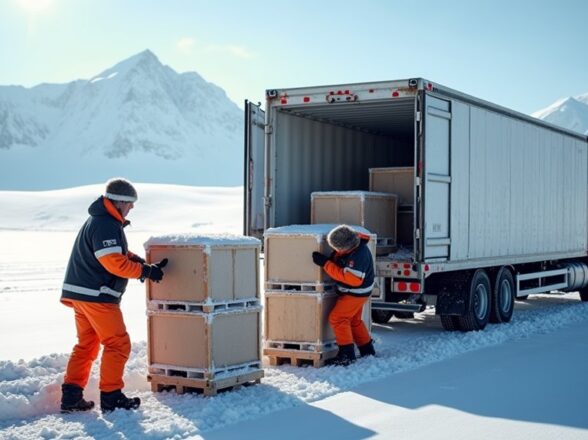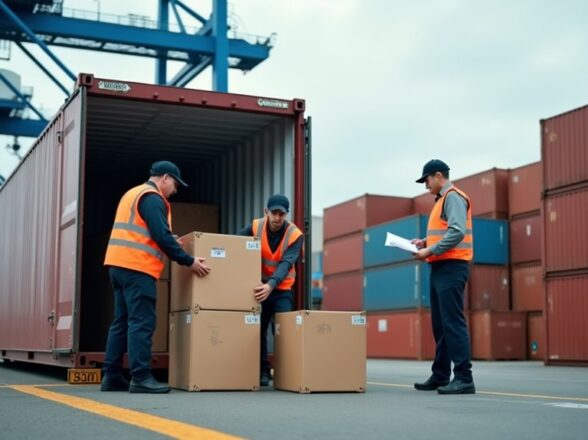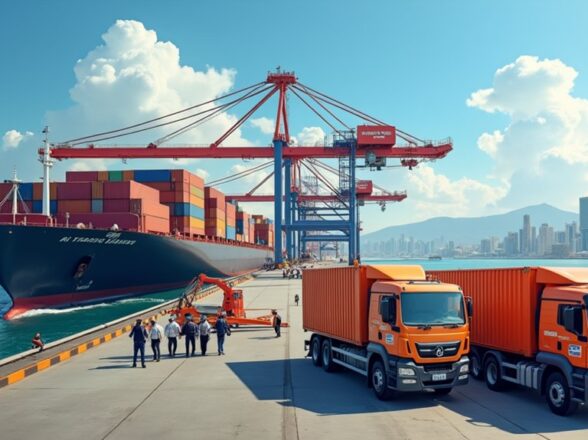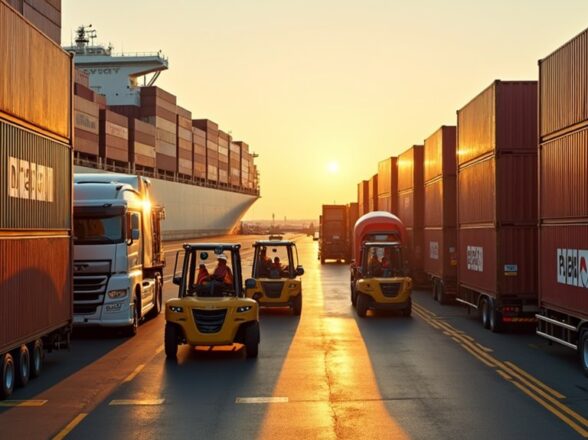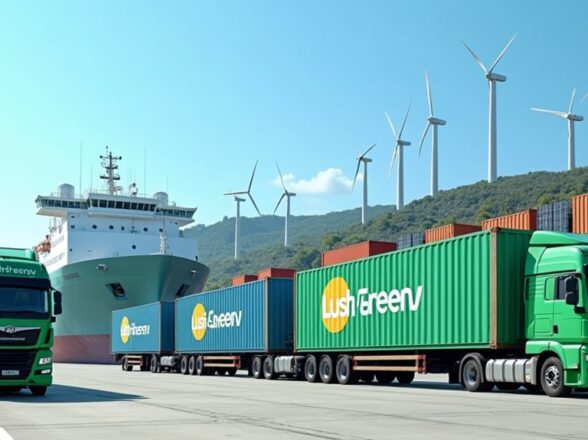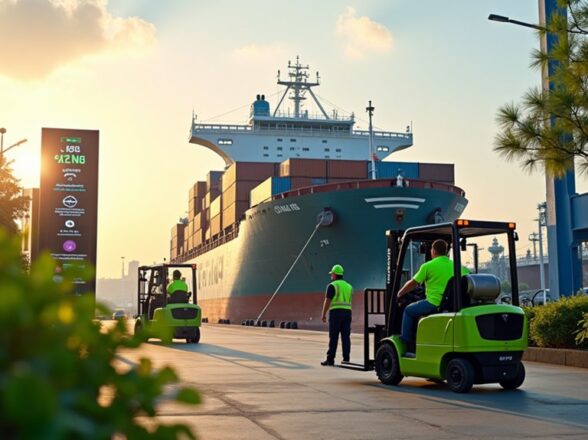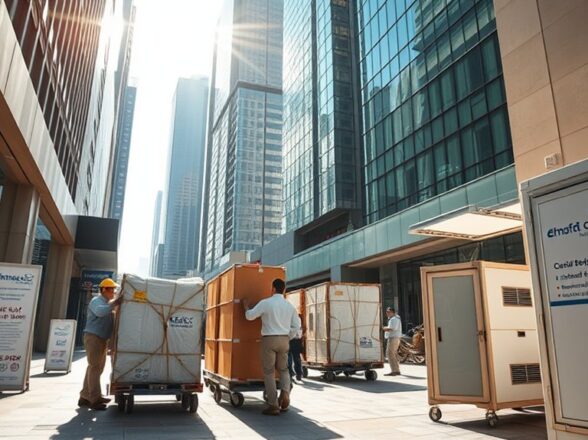What Are the Legal Liabilities of International Movers in Dubai?

International movers in Dubai have several legal liabilities they must consider. They must comply with UAE laws and international shipping regulations. This includes accurate customs documentation to avoid penalties and delays. If any damage occurs during transport due to negligence, the mover is liable unless proper insurance is in place. Clear contractual obligations must be met to prevent misunderstandings with clients. Furthermore, timely communication about schedules and claims must be handled within seven days of delivery. Understanding these liabilities is essential for smooth operations. To get further insights into this topic, you might find exploring additional details beneficial.
Key Takeaways
- International movers in Dubai must comply with UAE laws and customs regulations to avoid legal penalties and operational disruptions.
- Movers are liable for damages caused by negligence or improper packing, requiring adequate insurance coverage for protection.
- Accurate customs documentation is essential; discrepancies can lead to fines, delays, and potential confiscation of goods.
- Failure to meet contractual obligations can result in legal liabilities, emphasizing the need for clear service contracts and terms.
- Timely communication regarding service changes and claims filing is vital for maintaining client trust and avoiding compensation issues.
Overview of Legal Liabilities

When you hire international movers in Dubai, it's important to understand their legal liabilities. These movers are required to comply with UAE laws, including customs regulations. If they fail to provide accurate documentation, it can lead to delays or even the confiscation of your goods. They're also liable for damages or loss of items during transit. This means it's critical to guarantee they have appropriate insurance coverage. Additionally, any legal disputes related to service agreements must be settled in Dubai Courts. Clear contracts and terms of service are significant to avoid misunderstandings. Finally, movers must also adhere to labor laws to protect employee rights, adding another layer to their legal responsibilities in Dubai. It's advisable to start planning your move 3-6 months in advance to ensure all legal and logistical aspects are well-organized.
Compliance With International Regulations
To guarantee a smooth moving process, international movers in Dubai must strictly comply with both local and international regulations. Compliance with UAE Federal Law No. 8 of 1980 guarantees fair treatment of employees in the moving industry. Additionally, adhering to the International Maritime Organization guidelines is vital for safe transport across borders. Proper customs clearance is important, as movers must prepare accurate documentation to avoid penalties. They also need to understand the Convention on the Contract for the International Sale of Goods, which affects cross-border transaction liabilities. Research reputable movers helps ensure that the moving company is experienced in international logistics and customs handling, reducing the risk of non-compliance. Failing to comply with these international regulations can lead to serious legal liabilities, including fines, loss of business licenses, and civil claims from affected parties.
Damage and Loss Responsibilities

Ensuring the safe transport of your belongings is a primary responsibility of international movers in Dubai, and they must take every precaution to prevent damage or loss during the relocation process. Movers are liable for damages caused by negligence or improper packing. They're also required to offer shipping insurance options with varying coverage levels based on your items' value. If you experience damage or loss, you need to report it within seven days of delivery to file a compensation claim. Clear documentation of your items' condition, such as inventory lists and photographs, is essential. This helps movers address claims effectively and minimizes their liability related to customs regulations and other responsibilities during your move. Additionally, it's crucial to understand moving insurance options to ensure adequate protection for your belongings, as basic coverage may not fully cover the value of your items.
Customs Documentation Obligations
International movers in Dubai must prepare and submit accurate customs documentation, as this is vital for the smooth clearance of your goods at customs. You need to include invoices, packing lists, and certificates of origin to comply with UAE regulations. Any discrepancies in these documents can lead to delays, fines, or even confiscation of your items. It's important to understand specific requirements for different types of goods, especially restricted items that may require extra permits for importation. Failing to provide proper customs documentation can result in legal liabilities for international movers, including financial penalties and the potential loss of operating licenses. Staying updated on changes in customs laws helps guarantee your documentation is accurate before shipment.
Contractual Obligations and Standards

When you hire international movers in Dubai, they've got specific contractual responsibilities to meet. These include following local regulations and ensuring your goods are handled properly. If they fail to deliver on these obligations, they could be held liable for any damages or losses that occur during the move. Additionally, services offered by international moving assistance often include customs clearance, which is crucial for ensuring a smooth transition across borders.
Contractual Responsibilities of Movers
While moving your belongings across borders can be exciting, understanding the contractual responsibilities of movers in Dubai is vital for a smooth experience. International movers are legally bound by the terms and conditions in their service contracts. These contracts outline specific obligations, including safe handling, packing, and transportation of your goods. If movers fail to meet these contractual responsibilities, they may face legal liabilities, such as financial compensation for damages or losses. It's important to discuss insurance options with your mover, as this coverage is often required in their agreements. By knowing these aspects, you can guarantee that your moving experience is not only efficient but also protected against potential risks. Additionally, many movers in Dubai have an established reputation for offering reliable and efficient service, which is reflected in their high customer satisfaction ratings.
Compliance With Local Regulations
Complying with local regulations is vital for movers in Dubai, as it guarantees they operate within the legal framework and maintain high service standards. International movers must adhere to UAE laws, including the UAE Commercial Transactions Law, which governs contractual obligations. You need to maintain valid business licenses and follow guidelines set by the Dubai Department of Economic Development. Your contracts with clients should clearly outline services, fees, and liabilities to promote transparency. Also, compliance with international shipping standards is essential, particularly the International Maritime Organization regulations for maritime transport. Finally, make certain your operations meet local customs regulations and documentation requirements to avoid legal issues during customs clearance. It's crucial that movers verify their company licenses and insurance credentials to ensure legitimacy and protect against potential disputes.
Liability for Damages and Loss
Understanding your legal liabilities as an international mover in Dubai is critical, especially regarding damages and loss during the moving process. Typically, your liability for damages is outlined in your contract, often limited to a percentage of the declared value of the goods. You may also offer additional insurance for full value protection. Compliance with laws is essential, including obtaining necessary permits and using proper packing materials to reduce damage risks. If items are lost or damaged, your contract will detail the claims process, requiring customers to report issues within a specific timeframe. Remember, liability for loss may decrease if customers don't declare high-value items or ignore packing instructions. Ensuring compliance with international shipping regulations is crucial for maintaining accountability and avoiding legal issues during international relocations.
Insurance Coverage Requirements
When planning your move internationally, it is crucial to know that international movers in Dubai must offer extensive insurance coverage to safeguard your belongings. The insurance coverage requirements include thorough shipping and moving insurance options to protect against loss or damage during transit. Typically, the minimum insurance coverage should match the value of your items, ensuring you receive adequate compensation in case of mishaps. Movers are responsible for clearly communicating the terms and limitations of their insurance policies, including deductibles and claims procedures. Additionally, they must maintain insurance that complies with UAE regulations, addressing liability claims related to international shipping. Knowing these requirements helps you make informed decisions and protects your interests throughout the moving process. Furthermore, understanding the key factors influencing moving costs can aid in budgeting effectively for your relocation.
Timelines and Delivery Commitments

When you hire international movers in Dubai, you expect clear timelines for packing, shipping, and delivery. It's important to know that if delays occur, you may be entitled to compensation based on the service agreement. Always review the mover's delivery policies to understand your rights regarding any potential disruptions.
Delivery Schedule Expectations
Clear delivery schedule expectations are essential for a smooth relocation process, as they set the foundation for your moving experience. When working with international movers, consider these important points:
- Ascertain your contract includes clear timelines for each stage of the move.
- Understand that delays can lead to legal liabilities if negligence occurs, as outlined by UAE consumer protection laws.
- Expect movers to communicate any changes to the delivery schedule promptly.
- Keep documentation organized to mitigate risks and comply with local regulations.
Compensation for Delays
Delays in delivery can create significant challenges for clients, especially if international movers in Dubai don't adhere to the timelines set in the contract. When these delays occur, clients can file compensation claims based on the service contract terms. If the mover is responsible for the delay due to poor planning or staffing, they may face liability for the inconvenience caused. However, if delays stem from external factors, like customs issues, liability may be limited.
| Factor | Liability |
|---|---|
| Mover's Control | Full liability for compensation |
| External Factors | Limited liability, per contract |
| Communication | Reduces claims and maintains trust |
Understanding these aspects can help you navigate the potential challenges related to delays.
Client Compensation Claims
While moving your belongings internationally can be a challenging task, understanding your rights regarding client compensation claims can ease some of that stress. Here are key points to evaluate:
- File your claim promptly: Submit your claim within seven days of delivery.
- Document the damage: Include photographs and evidence of the original value of the items.
- Know the liability of international movers: Compensation is often limited to the declared value of your goods.
- Follow the claims process: Notify customer service and provide a written claim as outlined in your service agreement.
Proper insurance coverage for high-value items can protect you from significant financial loss. Familiarizing yourself with these details can help you navigate the claims process effectively.
Best Practices for Movers

Understanding client compensation claims is just one part of a mover's responsibilities in Dubai. To manage legal liabilities effectively, you should follow best practices for movers. First, guarantee compliance with local regulations and obtain necessary permits. This helps you avoid legal issues. Next, maintain transparent communication regarding service terms and pricing, which builds customer trust and reduces disputes. It's also crucial to implement extensive insurance coverage for goods in transit, protecting both you and your clients from loss or damage. Additionally, train your employees thoroughly on handling and transportation regulations to minimize risks. Finally, regularly update contracts to reflect changes in legal requirements and industry standards, guaranteeing ongoing compliance and reduced liability risks.
Frequently Asked Questions
What Are the Protections of Labour Law in UAE?
In the UAE, employee rights include clear contract stipulations, workplace safety regulations, and severance pay during termination procedures. You can rely on these protections to guarantee fair treatment and secure working conditions throughout your employment.
What Are the Labor Laws in Dubai?
Isn't it amusing how labor rights actually guarantee your security? In Dubai, employment contracts dictate terms, work permits legitimize your status, and wage regulations assure fair pay, creating a structured environment for all workers.
What Are the Rules and Regulations in Dubai?
In Dubai, you'll need to follow strict regulations for international shipping, including customs procedures and freight insurance. Understanding these rules guarantees smooth operations and compliance, protecting both your business and customers from potential issues.
How Much to Tip Movers in Dubai?
Imagine you've just moved into your dream home. To show appreciation for the movers' exceptional service quality, consider tipping 15% of the moving costs. This small gesture boosts customer satisfaction and honors tipping etiquette.
Conclusion
In summary, understanding the legal liabilities of international movers in Dubai is vital for both clients and service providers. Movers must comply with various regulations, handle damage and loss responsibly, and guarantee proper customs documentation. Notably, studies show that over 20% of international shipments experience some form of damage or loss. Being aware of these responsibilities helps guarantee smoother relocations and protects everyone's interests. By following best practices, movers can minimize risks and enhance client satisfaction.
Related posts
Recent posts
Post Categories
Tags
Subscribe

